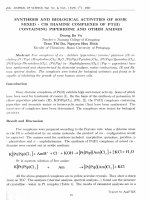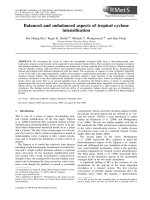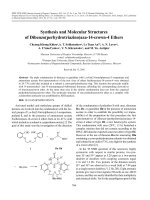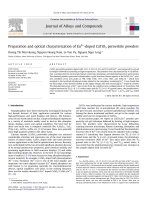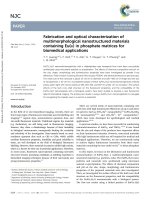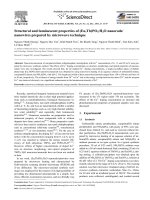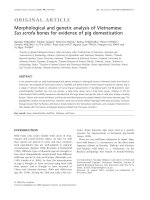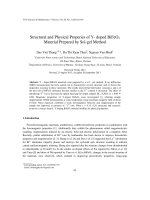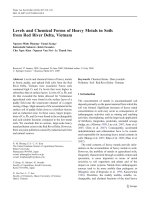DSpace at VNU: Confucianism and the future of law in Vietnam
Bạn đang xem bản rút gọn của tài liệu. Xem và tải ngay bản đầy đủ của tài liệu tại đây (5.2 MB, 11 trang )
OUPM A L OF SCIENCE, ECO NO M ICS-LAW , N01E, 2004
VN_Í
O N 7U C IA N ISM AND THE FU TU R E OF THE LAW IN VIETNAM
P ham D uy N ghia (•)
was
to explain w h a t the s ta te and law are.
e a teau tiful house blown down by a
According to the hackneyed cliche, “the
die to lack of re p a ir” and which
law-based s ta te ” one of some newlyborrowed concepts, if not defined exactly,
ụhet.ier
Confucianism,
which
m . to have been d e v asta ted by different
-t>‘rn schools of tho ug ht, plays any role
is often rashly reasoned as a type of state.
Fortunately, th e in tellectual have been
,h3 col stru ctio n of th e V ietnam ese law
n kỉeps torm enting the contemporary
s
â
ị the n ext generations.
enlightened th a t
governm ent’s tool.
This article
law
is
not
ju s t
a
c}es ipon some problem s re lating to
The questions raised h e re are ‘W h at
Ị r)le jnd lim itation of law in th e way it
are the striking features in th e history of
. u>ncf3 people’s
the
V ietnam ese state and law developm ent
ojicti'n betw een C onfucianism and th e
and a p a r t from th e influence of Chinese
measures
behaviors
to
a d ju st
and
people’s
c u ltu re ’. ‘W hat distin gu ished V ietnam ese
^ia/ior. This article also raises some
legal
rysal to m ake contribution to bringing
]^
vtiarri’ w ritten law close to its people.
questions need an sw ering for every nation
p a tte rn s
in
o th e rs ’. Both
these
which rule over its people’s behaviors.
After the Cold War, ideology h as no
longer been a gap betw een nations. While
] is common knowledge th a t cultural
e e n o m ic
from
has its own characteristic, and custom s
.ADoctrine for V ietn a m ese C urrent
Law
d
culture
legal harm on izatio n is pu shed up by global
different
free trade,
the
im portance
of national
‘i^ies from Prim itive Com m unism ,
iV>ry Feudalist, C ap italist to Socialist
, - ị e s \re widely introduced in the s tate
cultural
J rental law textbooks. Sometimes, the
significant. This is sim ilar to the freedom
li y £ our n a tion is ignored so the
cuntry fits in one ready made
)C?1 A such, th e re h ave been different
of state and law. It is jurisdictional
and
pcern
V ietnam ese
out the in su lt of being poor an d backward,
ijsopy
t h a t universe, h u m a n
ir s a d society th a t are often based on
the very first th in g th a t le a rn e rs of law
doctrines,
not
legal
identity
culture,
p reserv atio n
h as
independence
become
protection
including
extrem ely
of
our
country from colonialists’ invasion in the
n in e te en th
century.
So,
in
order
to
preserve national ch aracteristics and w ash
should do is to u n d e rs ta n d a n d honor the
legal culture and jurisdictional philosophy
of th e ir country.
r acultofLaw, Vietnam National University, Hanoi.
24
Confucianism and the future o f the law in Vietnam
- — —25
To u n d e rs ta n d V ietnam ese law and
its social organization, it is a need to
u n d e rsta n d V ietnam ese history of ideology
developm ent for people’s way of thin k ing
affects th e ir behaviors. Only by th a t way
can
we
explain
w hat
th e
V ietnam ese
respect, love, h a te or fear as well as can
u n d e rs ta n d th e way they organize th eir
own activities, which is so called culture.
V ietnam ese ideology can be divided into
two categories: Common ideology- ideology
of common people, descended from this
generation to a n o th e r by m ean s of folklore
and academic ideology- ideology of the
intellectual.
Such
tra d itio n a l
ideologies
should be studied thoroughly and han ded
down to the next generation before alien
ones come up with.
n a tu ra lly t h a t it leaves tra c e ln
V ietnam ese cultu ra l vestige.
T hro ug ho ut history, each
eYy
ago
own u n d e rs ta n d in g of Confucianism Y\
are different schools of Confi-ucHn
m
Confucianii: m, I
n
Confucianism, T ang Confuciam
including
Prim itive
16m .
s,
Confucianism, Neo-Confucianism,
T raditional C onfucianism ,
fcchcia
1C
Confucianism a n d Common Confucia •
1
C ontem porary Neo-Confucianism K*r
rn
Confucianism, J a p a n e s e Confuciaiisi
Singapore
C onfucianism . ...Of
L
:ne
v arian ts, th e re m u st be unchan^pH
^
r t.
Also, as a th o u g h t of life, Confucia
Song
Confucianism
in
parti-ula*
’ẵ
th o u g h t based on a m ix tu re of Bucdl
most
and Taoist elem en ts and indigenous lai'
gradually becam e ethnics of lifci. It „
fu n d a m e n tal elem en ts in the foundation of
t h a t the Ja p a n e se , K orean and Cl n.
the V ietnam ese ideology. It is believed
w a n t to b reak th is tra d itio n a l Pliloo,'
th a t Confucianism is one of th e three
of life while enriching th e ir couit'ies A
religions
thought,
Confucianism
is
one
of
(Confucianism,
Buddhism)
which
the
Taoism
influence
and
V ietnam ese
once
deep-rooted
in p^p
consciousness, in spite of be:nj dft]
culture. In fact, C onfucianism is not an
Confucianism does live perm am rU y 1
ideology because it was not Confucius who
way it affects people’s way of tliik in I
created
th e ir
th a t
kind
of
m entality.
And
behaviors.
Thus,
studying
Confucianism is not a religion of which
trad itio n al philosophy to e x p l a n w h c
Confucius is the h ead like th e case of
s tate a n d law are m e an s stacyin
Catholicism a n d Jesu s. Confucianism is a
trad itio n al
way
philosophy
forefathers
to
of life
according
to
which
of
thinking
explain
sone
of
ci*r
people live a comfortable a n d peaceful life,
phenom ena. This is a key to bnrg W(t
w ith no difficulties in th e ir household,
legal docum ents close to the n erets
th e ir clan, th e ir village a n d th e ir natio nal
people in V ietnam . Only by that wa
affairs. This kin d of philosophy h a s been a
law
foundation
consciousness.
for
V ietn am ese
society
for
live
p e rm a n e n tly
O therw ise,
h
pep.
al bor-)v
th o u san d s of years a n d p e n e tra te d into
schools of th o u g h t will soon befogotij-
V ietnam ese consciousness so deeply and
our thou sand -yearlon g histor;/.
V N I L Journal o f Science. Economic
s
-Im w ,
N„IE, 2004
Pham Duy Nghia
26
T here may be some un derly ing reasons
for
Confucianism’s
being
devastated.
Firstly, it may originate from th e W estern
education movem ent in which c u lture and
civilization
were
mixed
m eanw hile
Confucians were bew ildered about w h a t to
do
next
to
catch
up
w ith
W estern
civilization. Secondly, it m ay begin from
revolutionists’ movement of using Vietnamese
originates from w h ere one s ta rts to find
the h arm on y betw een individual and the
universe introspectively.
According to th e books of th e Mean,
Way of N a tu re is w h a t is endowed by God
over which people’s behaviors are ruled.
Because everyone h as his own characters
and inborn m akings, one is too much while
tra n scrip t which un in te n tio n a lly created
the o ther is not enough, he needs to be
the gap disabling th e offspring to read
educated appropriately. T em p e ra te person
th e ir
an n als.
F u rth erm o re ,
is the one who knows how to control his
was
h a rs h
emotions,
e ith e r
Confucianism m ovem ent like t h a t in C hina
everything
is
after the Chinese revolution, Confucianism
medium is im p a rtia l behavior, a basis for
in V ietnam
leading
the right. The harmonious is uncontradictory
doctrine in organizing society. It more or
behavior - a common link betw een people.
less lost its hold on th e nation. People only
Therefore, Confucianism is a Doctrine of
family
although
used
there
was
some
old
Confucianism
no
no
longer
m anner
to
of
a
anti-
speech
propagandize
of
happy
kept
or
angry,
moderately.
The
the M e a n .[2, pg. 20]
new
political tho ug hts borrowed from the West.
C onfucianism ’s philosophy of life is
Not un til recent tim e h a s Confucianism
mostly
been studied again, which can be seen as
including
the
roots
civility, know ledge a n d loyalty, of which
aroused
benevolence is considered as the key to
inte re st am ong W estern scholars. W h at a
Confucian ethics. Like an energy storing
sham e to us! T h a t Confucianism research
seed giving life to buds, leaves and twigs,
foundations have been m ushroom ing both
benevolence decides h u m a n
instinctive
while
in
O riental
Europe
am azing
and
r e tu rn in g
to
c u ltu re
has
America
a ttra ctiv en e ss
th e
indicates
of
the
O riental
philosophy of life in th e m odern world.
2. In tr o sp e c tiv e n e ss and T h eory o f
R ectifica tio n
of
N am es
as
C on fu cian ism ’s M ea su res to A djust
P e o p le’s B eh a v io rs
based
on
five
benevolence,
basic
virtues
righteousness ,
appearance
and characters. The concept of benevolence
in Confucianism is considered a fulcrum to
push a large p a r t of h u m a n society into a
stable,
peaceful
and
kindness-oriented
world. Benevolence carries in it a narrow
m eaning b u t also enjoys a broad sense a t
the sam e time. It fits all kinds of people. It
Like
oth er
E a s te rn
philosophies,
Confucianism believes t h a t th e p ath to
may ta k e a whole C onfucian’s life ju st to
look for th e values of th e word.
discover a n d conquer th e outside world
V N U . Journal o f Sc ience, Economics-Law, N„IE, 2004
Confucianism and the future o f the law in Vietnam
The
m ost
general
27
m eaning
of
Confucius
benevolence is love for all h u m a n beings.
A nnals
The
Mencius
C hinese
c h a ra c te r
‘J e n ’
literally
of
th o u g h t
of
A u tu m n
highly
W arring
and
Spring
of benevolence,
th e
State
gave
re p re se n ts th e relationship betw een "two
prominence to righ teou sness which is w hat
persons,"
should be done by an individual to the
or
co-humanity.
People
with
benevolence are th e ones who love th eir
community.
pare n ts, siblings, spouse as well as their
know how to live sincerely, to hold back his
fellow countrym en, and who have no ill
sexual desire to keep things in order, to
feelings for anyone. Benevolence is best
regret m aking m istakes, which keep them
expressed in th e Confucian golden rule,
away from evils. They should neith er be
"Do not do to others w h a t you do not w ant
fond of richness nor a sh a m e d of poverty.
done to yourself'.
These people always
As a h u m a n , th e two most valuable things
consider o th e rs as th e ir dear, th in k in g of
are benevolence an d righteousness without
the universe as a unity, showing th eir
which
n a tu r a l not re lu c ta n t love. Thus, they
respecting.
surely enjoy a peaceful s ta te of mind and
security.
In
contrast,
people
w ithout
benevolence have none [14, pg 82-83].
a
People
w ith
powerful
king
righteousness
is
not
worth
In co n trast to M encius' supposition
th a t h u m a n beings’ in n a te n a tu re should
only be nourished, according to Hsyn-tzu
Benevolence also m eans tolerance to
a person is born with an evil nature,
others, a good u n d e rs ta n d in g to have the
therefore
rig h t a ttitu d e
u n d e r all circum stances,
civility. People w ith civility know how to
courage to a ssu m e responsibilities to be on
supress th e ir sexual desire so th a t all
o ne’s gu ard w ithin civility rules. In other
thoughts,
words, benevolence helps people control
conformity
th e ir desires an d re sist all tem ptations.
respect to th e noble, piety to the old, faith
G entlem en
alw ays ta k e benevolence
into account in all his activities like eating,
d ressin g a n d
difficulties.
speaking...
in
Confucianism
h u rries or
is
therefore
practiced exactly like a religion. Such a
belief
an d
discipline
formed
ancient
Confucians whom scholar N guyen Khac
V ien
considered
respectable.
to
be
stran g e
bu t
The root of W estern legal
c u ltu re is Catholicism while t h a t of the
O rie n t is Confucianism.
a tte n tio n
words
w ith
to th e superior,
tolerance
m eans
to
should
and
be
paid
behaviors
civility.
are
Civility
to
in
m ans
modesty to the junior,
the
coward.
cautiousness
in
Civility
also
speaking
and
dressing behaviors. According to Hsyn-tzu,
a nation w here righ teou sness and civility
are respected is in order, otherw ise it gets
into chaos. “L earn how to behave first and
th e n
to re a d
an d
commonly
found
originates
from
w rite” - the slogan
in
schools
H sy n-tzu’s
nowadays
respect
for
civility.
Politically, H sy n-tzu ’s theory does not
put
V N U , Journal o f Science, Econom ics-Law, N ()IE, 2004
a
stre ss
on
legal
punishm ent.
28
Pham Duy Nghia
However,
because
it
m a in ta in s
th a t
to
avoid
p u n is h m e n ts
w ithout
being
h u m a n beings are born w ith desires th a t,
asham ed. However, it is not the case if
if not being guarded a n d restricted, would
they are oriented by m orality”(Analects,
lead h u m a n s to conflict a n d strife, and
c h ap te r II)
th a t in this sense h u m a n n a tu re is evil and
goodness is only acquired from training,
therefore, p u n is h m e n t is a m ajor concern.
For
Hsyn-tzu,
everybody
values
righteousness a n d benefits yet he should
use his knowledge to ta k e th in gs into
consideration.
Fei
and
Li
Of his two disciples, H an
Ssu,
H an
Fei
extraordinarily
ta le n te d
influenced
H syn-tzu’s
by
was
and
more
heavily
respect
for
civility. As a result, he extrem ized the
th ou gh t into legal fram ew ork and used
“fame form ation” theory as a tool to govern
A part from introspectiveness, theory of
policy is also a tool of Confucianism to
educate people. T his th e o ry was discreetly
implicated in th e
A u tu m n
and
Spring
Annals p ray ers a n d note-takin gs in the
Analects of Confucius. According to the
Analects of Confucius, Confucius said th a t
irratified
n a m es
lead
to
inconsistent
words, incomplete w ork, merciless chorus
and wrong p u n is h m e n t which, in tu rn
resulted in people’s confusion. So, for a
virtuous m an w ith ra tified name, words
and deeds accom panied each o th e i.
the country.
A nother
In short, Confucianism is a foundation
of
self-adjustm ent,
self-correction
and
sh am e preservation a n d it is a traditio n al
thought to govern a nation. Confucianism
considers m orality as a basis of politics [7,
pg 53].
Although Confucianism does not
deny the role of law in k eeping the society
in order, it h ead s to the root of se urity
ra th e r th a n th e p u n is h m e n t used for those
who commit crimes. A good point of civility
is th a t it p rev en ts the evil even w hen there
is no sign of it in o rder to bring people
close to th e good, stay aw ay from the evil
w ithout th e ir consciousness. Thus, civility
has
an
educational
role,
preventing
insecure seeds while law is a n imposing
and dom inating tool of th e ruler. Confucius
once said “If th e s ta te affairs are used to
orientate people, p u n is h m e n ts are used to
im plem ent the equality, people surely try
C onfucian
th o u g h t
is
m ain ta in in g an o rderly society of rank s
and classes. Confucius said: "There was
Tao (a way or road of righteousness) only
when fa th e rs w ere fa th e rs, w hen sons
were sons, w hen R u le rs were Rulers and
when
m inisters w ere
ministers."
Every
society is Dased on fam ily of which a
virtuous m an is th e r u le r literally. This
one
should
Knowledge
considered
be
and
as
two
ed u cated
civility
carefully.
should
mottoes.
be
Civility is
morality, knowledge is u n d e rs ta n d in g [ 1 2 ,
pg22o]. M anaging o n e ’s household m eans
keeping
family
faithful,
one’s fam ily
m em bers
th e
arv
inferior
in
harm ony.
emotional
su bm its
to
All
and
the
superior, th e su p erio rs ta k e care of the
inferior. So, t iat for h e rs should be fathers
m eans p a re n ts w h e n alive should have
sense of purpose a n d w h en dead should be
VNU, Journal o f Science, EconomicS-Law, N„IE. 2004
C onfucianism and the future o f the law in Vietnam
29
a good exam ple for children to follow.
should realize such non-motives and limit
F a th e r ’s pro priety is clemency, child ren’s
their negative impacts.
prop riety is piety.
Confucianism be useful to our p resen t day
From
then, people’s
behaviors are ru le d over by w h a t people
Only then can
life .
call “ratified n a m e s .”
3.
dynasty,
In n er C on fu cian ism and O uter
L eg isla tio n as a U n iq ue O riental
L egal C ulture
Confucianism w as continually distorted to
Chinese H istory says in 536 BC Ching
Regretfully, a fte r h aving become an
official
a ss e rt
doctrine
the
of
r u le r s ’
H an
H an
d yn asty ’s King introduced the Book of law.
the
interaction betw een th e superior and the
In 513 liC, u n d e r Tan dy n asty ’s King
order, a huge cauldron on which the
inferior. It only focused on th e duties of
legislation
was
being obedient of th e inferior. The concept
criminals.
As tim e w en t by, a school in
of th re e moral bonds m ay be shap ed by
favor of rule by law emerged. Rules by
T u n g C h u ng -sh u a t t h a t t i m e [ l l , p g l 8 ó].
morality a n d law were two most popular
The notion of loyalty, piety, a w o m a n s
th re e obediences a n d four v irtu es were
schools in th e A utum n a n d Spring Annals
and W arring The s ta te s period. Debates
som etim es
For
betw eens scholars of those two schools
exam ple, a female, before m arriage, was
contributed to th e sh ap in g of legal forms of
considered as to obey all h e r p a re n ts ’
the E a s te rn countries u n d e r the influence
orders, for exam ple
of
C onfucianism
authority.
seem ed
abn o rm a lly
to
forget
understood.
m a rry the one th a t
C hinese
carved
culture.
was
Chi’in
used
for
dynasty
h e r p a re n ts had selected for h e r w ithout
followed th e school of th o u g h t in favor of
freedom in love a n d m arriage. After being
rule by law.
From 350 BC,
privatization
was
im plem ented,
m arried , she should obey all her h u s b a n d ’s
o rd e rs and w hen h er spouse is dead, she
m u s t obey h e r son. Since H an dynasty
opened an e x am in atio n session in 14 BC,
le a rn e rs only focused on learn ing by h e a rt
for exam inations. T hey more or less lost
th e
original
c re ativ e n e ss
in
learning.
land
the
monopoly by the a risto c ra t w as abolished.
All people both worked a n d fought, which
resulted in th e prosperity and power of
Chi’in dy snasty 120 years later (227 BCE),
w hen the first em p ero r of Chi-in dynasty
unified th e whole country.
gradually
On re a d in g th e w orks of H an Fei (280-
b ecam e conservative, com placent and anti-
233 BC)- th e most typical rep resentativ e of
lnnovative in both political and economic
the rule-by-law school which were w ritten
te rm s.
in prison w ith
C onsequently,
In
C onfucianism
p a ra llel
w ith
golden
rules
k eep ing the society in order, some r u ’es of
C onfucianism
w ere
like
hindrances
k e ep in g the c o u n try behind th e re st of the
world. The key point here is th a t we
VNU, Journal o f Science, Economic S - L u w , N J E , 2004
m en tal sufferings, more
th a n two th o u s a n d s years later, one is
am azed a t th e sh arp-w itted th o u g h t of
which the in ta c t values are
rem ained at
present time. Han Fei’s views are as follows:
Pham Duy Nghia
4
Law
m u st be tra n s p a r e n t.
Only
tr a n s p a r e n t law can b ring prosperous and
p e a c e fu l
tim es
time
on,
a
tre n d
to
combine
both
Confucianism a n d legislation to rule the
country came into existence. Also from
[4 , p g 7 3 ] .
« L aw m u st be strictly followed. Law
w h a t is used for th e public, p u n is h m e n t
is u s e d to direct one’s behaviors, so th a t
people follow rules w ith o u t uncertain ty.
Those who obey such ru le s a re rew arded
white th o se who do not are punished.
th e n on Confucianism h a s been deeply
im bued
in
O rien tal
legislation.
Confucianism does not deny and criticize
b u t m akes light of h a r s h pu nish m en ts.
The
society
should
be
by
morality
organized a n d should be based on rule.
Self-education w ith the five basic vertues-
ệ People of any position a n d ra n k are
benevolence,
righteousness,
civility,
treated equally before law. Law does not
knowledge and loyalty should be used as a
side
is
principle to correct oneself, to m anage
not
one’s household, to rule th e country and
w ith
implemented,
th e
the
rich.
Once
to le ra n t
law
dare
tjlerate, the b rave d a re not compete w ith
pacify
l;lW. P u n is h m e n t and re w ard s a re not only
Confucianism which have been adjusted
far any given subjects. Even a n aristo crat
for centu ries now replace a major p a rt of
can be
the functions of law.
pu n ish ed
and
a
boor can
be
th e
world.
M oral
rules
of
r e w a r d e d [3 , p g 4 3 ].
ệ U nlike “ratified n a m e ” theory of
4. Six P rop osals to B rin g W ritten Law
C loser to P e o p le’s In terests
Confucianism which w as u sed to assu re
The p rim ary objective of legislation is
the relationship betw een classes, H a n Fei’s
‘n a n e form ation” th eo ry accidentally or
purposefully aim ed a t elim in atin g social
clashes. A chievem ents should be accessed
according to work types. If achievem ents
to
serve
people’s
benefits,
not
the
constitution. In th a t spirit, the following
six
proposals
should
be
ta k en
into
consideration.
fit cbeds a n d deeds fit words, th e re should
F ir s tly , law is closer to people and is
|ie i.wards. O therw ise, th e re should be
more effective w hen people willingly follow
p u nsh m en ts.
rules. B ut it is the case w hen law is close
Although H an Fei’s books w ere highly
appieciated in C hi’in D ynasty, after the
eclipse of this dynasty, school favor of rule
•>y
law
was
overshadow ed
by
> n u c i a n i s m ’s school favor of rule by
norility. H an E m p eror Wu h a d to use
egiilation to deal w ith domestic affairs
ind use C onfucianism for diplomatic ones
n O'der to keep society in order. From th a t
to th e ir needs, th e ir dem and as well as
th e ir w ants. On th e contrary, w hen law is
a g ain st n a tu re , a g ain st people’s wish, it
will be boycotted no m a tte r how h arsh,
forceful and th re a te n in g p u n ish m en ts are
used. Then the illegal is common, the legal
is
exceptional.
Therefore,
making
law
stric te r and more effective m eans b e tte r
p resen ting people’s views and interests.
V' NU, Journal o f Science, Economics-Law, N„IE, 2004
Confucianism and the future o f the law in Vietnam
The
insufficiency,
overlapping
and
organizations such as p a rty organisations
contradiction of legal docum ents or the
and tra d e union. As the ruling part}, the
lack of legal staff are ju s t only tem p orary
V ietnam ese C om m un ist P a rty plays; <
and
the
role in establishing and im plem enting law
ineffectiveness. The key is to bring the soul
procedures. T h a t people are rich 0)r poor
of law n e a re r to people’s consciousness and
and the country is powerful or n.)t IS
interests. It is necessary to rally 80 million
mainly a ttrib u te d to th e P a rty ’s p-oicies
V ietnam ese
The
superficial
reason s
people
in
for
organizations
P a rty ’s
political
do cu m ents
^ rcj
re p re se n tin g th e ir various in terests. There
resolutions
are
based
on
should be unions, associations, religions
legislation,
and
o th e r
socio-ecoiomic
and p arties to promote people’s will —a
policies respectively. At th e sam e tiln* t i e
suprem e will which conquers all forces of
governm ent and o th e r s ta te bodies issue
the state.
official legal directives to realize
S e c o n d ly ,
law
and
law
m easures
should be redefined if people are viewed as
root, the s ta te is viewed as tool not the
oth er way round. Law is not ju s t a set of
rules set by the sta te b u t a reflection of
people’s desires which are converted into
laws. The bodies who speak those desires
and p re sen t a lot of unions should not be
ju s t
legislative
but
also
juridical
to
form
hone
guidelines. In o th e r words, V ietnanese
law is mostly based on P a rty ’s idetlogy
However, due to some technical consents
in legislation, the tran sm issio n from deas
into
w ritten
imperfect
between
legal
th a t
docum ents
th e
political
i;
H0
m isunderstaidir.g
o rientatio n
a n d legal
norms still exists.
F o u r th ly ,
w hen
b u sin essm en
a?e
organizations. In modern time, rigid laws
given more freedom to trade, they iurey
have been grad ually replaced by soft laws
will become a powerful force in the Sicieiy
set up by lots of institutions. Once realized
who tries to gain control over ecoromi:
by public bodies of power such kinds of
cultural, a n d social life and
rules and regulations become law. Thus,
control politics a n d legislation soon. Tais g
establish ing and im plem entin g law is no
inevitable because bu sin essm en art aho
longer th e sole b usiness of the state, it
citizens, even some of th em are in th' leed
should be th e common b usiness of all
of creating n a tio n ’s prosperity.
Though
people in th e country. The s ta te ’s function
trade-union
oriinUd
is to e n su re proper law e sta b lish m e n t and
organizations’ activities, businessmen hy
im plem entation.
p ressure on governm ent and legislatures
T h i r d l y , a variety of people’s in terests
in co m m un ity principles of life, family and
villages’ ru le s as well as official legal
docum ents of the locality should be well
p resen ted
by
social
in stitu tio n s
V N U , Journal o f Science, Econom ic s - I m
w
\
and
N J E , 2004
and
interest-
of Oune
publicly or discreetly, they even t*y 0
control law. A typical example of tiis s
th a t C hinese local courts h a d to uffcr
from a g re a t p re ssu re caused by re.'ionil
rulers
as
th e ir
feud.
In
adiitioi,
Pham Duy Nghi a
32
b u s in e s s m e n
pre
getting
b etter
supposed
to
abolish
such
constitution
u n d e r s ta n d in g of settin g rules as th eir
violating rules. T here is a need to set up
own r i g h t and use it as a tool to respond to
a d m in istrativ e bodies to tr e a t violations of
m arktet changes a n d law ad ju stm en ts. This
institution s of power. T h ere is nothing new
p h e n o m e n o n is not a d eq u ately mentioned
in this because more th a n two h un dred
in V ie tn a m e s e law studies.
years
N ot
only
law
but
also
economic
tra n s a c tio n s in the m a rk e t are affected by
the r i g h t to set ru les a n d regulations of
b u sin essm en . The s ta te is not always a
comrruander b u t som etim es a co u n terp art
of b u sin e ssm e n . T h ere h a s no longer bee subm issiveness
but
competitiveness
ago,
the
W est
realized
th a t
governm ent w as not God. M uch longer
before
th e
E a st
th e y
know
such
in stitu tio ns to limit a n d balance power
should
be
set
up.
Regretfully,
two
centuries later, V ietnam ese is still at pains
to find th e '.vay to set up and use such
in stitu tio ns effectively.
betw een legal n orm s a n d b u sin essm en ’s
S i x t h l y , it is high tim e th e right to
in d e p en d e n t norms. This factor is worth
is
create rules of the judge was discussed.
The legal system in V ietnam h a s followed
im plem ented. Although th e s tate is not
the legal th o u g h t of th e F o rm er Soviet
to help b u sin essm en to realize,
Union, liy now, the N ational Assembly has
considering
su pposed
access
w hen
and
law
allocate
reform
b u sin ess
should
have
effective
protect
th e
public’s
abuses
of
u n e q u al
it
the rig h t to constitute laws and the right
to
to explain laws, in theory, is held by The
against
S tanding
Com m ittee
of
National
Assembly, yet in reality, it is in the hand
risks,
interv entio n
in te re sts
inform ation
and
of th-
competitive advantages.
governm ent
and
adm inistrative
institutions. V ietnam ese courts only have
F i f t h l y , not only elected bodies but
also judiciary org an ization s at all level,
eicher national or local ones have big
power
to
set up
governmental
circulars
or
or
rules.
Sometimes,
m in isterial
lette rs
or
the rig ht to <>pply and im p lem ent rules,
b ut not to create or explain them. The
practice to view legal procedures came into
being w hen the country w as u n d e r French
rule, according to which Inferior Court
decisions
by
People’s
should
all
are
of
consider
th e
Inferior
C ourt’s
Committee
of
high
decisions as one kind of law. Scholars also
practicality
and have b e tte r effects on
base them selves on legal procedures to
level
which mainly contain general principles.
build up theoretical
studies. These
practices were abolished in V ietnam in the
T.iis is an inevitable a n d unchangeable
late 1950s. V ietnam ese courts now only
fact. The th in g is we should supervise the
base them selves on legal documents, they
rights
do not correlate the ju d g m e n t of previous
every individual r a th e r th a n
to
set up
ru le s
to
any Acts
prevent
corruption. This gives rise to establishing
cases.
the institutions to protect th e law which is
V N U . Journal o f Sc ienc e, Economics-Imw, N„IE, 2004
C onfucianism and the future o f the law in Vietnam
N evertheless,
C ourt’s
s ta te of p role ta ria t dictatorship. .Judging
guidelines which have been sum m ed up
for objective tr u th procedures h a s been
from experience are more, or less worth
replaced by equal in s titu te proceedings
referring to in judging procedures. In th a t
b etw een the prosecutor and the lawyer
sense, to a c ertain extent, it h a s some
Among innovational th o u g h ts which have
impacts.
judge
been swept away by globalization storm
indepen dently are realized, th a t judges
should be given more power to set up
th e re a pp ears fam iliar Confucianism
Confucianism which has secured a firm
rules, apply, com m ent as well as explain
hold
laws
certainly
If
to
the
a d ju st
the
S u p rem e
33
Courts
some
which
p a rtic u la r
cases
on
V ietnam ese’s
will
lead
consciousness
us
to
peace
and
should be considered. It is reasonable if
deliberation to well organize a civil service
the function to explain law is g ra n te d to
system a n d legislation to serve its people
the
jurisdictional
better. W esterners hav e ta k e n a lot of
in stitu tio n s can judge w h a t deeds are legal
m e asu re s to m ake au th o rities subm it to
or illegal. Besides, outside th e Court, the
people’s will. Such m easu res should be
judge
soon learned like the way we should soon
Court,
b ecau se
should
only
consider
justice
and
theoretical studies as a sub sidiary source
le a rn how to m a ster all IT instrum ents
of his job. W hen th e re are no rules and
N evertheless, no m ạ tte r how good such
reg ulatio ns concerned, he should judge a
m e asu re s are, nothing can replace the
case basing on justice an d the right, not
living th o u g h t and ideology. We can not
respectfully su b m it th e record to his senior
use w h a t th e W esterners respect, hate or
an d w ait for the judgm ent. This kind of
d read to replace national consciousness
th o u g h t stem m ed from the concept th a t
L earn in g tKe superficial will ju s t increase
law
w ritten
people’s xenophilia, widen the gap betweer.
docum ents, th e re do exist law of th e right
generations, the sense of nationalism wil.
and law of conscience. The judge w ith his
fall
ju d g m e n t is not like th e official an d his
country. The s tate a n d legislation of tae
a d m in is tra tiv e decision. He should bring
V ietnam ese
law of conscience and th e rig h t close to life
explained
c re atin g law. (Latin root: juris-law; dicta-
ideology. -That
announce).
borrowed
does
not
only
contain
5. C o n clu sio n
People’s a w are n e ss of civic righ ts has
into
decadence,
should
on th e
is
th u s
be
weaken
establishec
of Vietnamese
W estern
civilization Ù
to
complement
to encourage
people
prom ote
quintessence.
a.ic
basis
shortcomings,
to
the
Vietnamese
th e ir
V ietnam ese
CUĨ
civil
m tio ta
ierv.ee
led to jurisdictional reforms, which can
system and legislation can not s ta r t with c
b ring changes to old schools of th e state
borrowed W estern school of th o u g it tu:
a n d legislation. A s ta te of people, by people
proceed w h a t we have had for thousands o'
a n d for people is on the way to replace the
years.
V N U , Journal o f Science, Econom ic S -L aw , N ()IE, 2004
34
Pham Duy Nghia
REFERENCES
1.
Đào Duy Anh, Việt N am Văn hóa s ử Cương, NXB Quan Hải Tùng, Huế, 1938.
2.
Hà Ngọc Xuyên, Không đại tinh hoa toát y ếu , Nhà Văn hóa, Phú quốc khanh đặc trách văn
hóa xuất bản, Sài Gòn, 1969.
3.
Hàn Phi, Hàn.Phi Tử, Bản dịch của Phan Ngọc, NXB Vãn học, Hà Nội, 1992.
4.
Hàn Phi, Thiên Ngũ Đố, Bản dịch trong tài liệu của Vũ Văn Mẫu, Pháp luật diễn giảng
Luật khoa đại học, Sài Gòn, 1975.
Nguyễn Đăng Dung, Một s ố vấn đề về hiến pháp và bộ máy nhà nước, NXB Giao thông vận
tải, Hà Nội, 2001.
5.
6.
Nguyễn Đăng Thục, Lịch sử tư tưởng Việt N a m , Tập 1, 2, Bộ Văn hóa, Sài Gòn, 1967.
7.
Nguyễn Hiến Lê, Nho giáo: Một triết lí chính trị, tác giả tự xuất bản, Sài Gòn, 1958.
8.
Nguyễn Kim Sơn, Nho giáo trong tương lai văn hóa Việt Nam, Tạp chí văn hóa nghệ th u ậ t,
2/ 2003.
9.
Nguyễn Khắc Viện, Bàn về đạo Nho, NXB Trẻ, TP Hồ Chí Minh, 1998, nguyên tác:
“Confucianisme et M arxism e au Vietnam ’ LA Pensee (1962) N 0.10, bản dịch Việt ngữ của
Đào Hùng và Trần Văn Quý.
10.
Phan Đại Doãn, Một s ố vấn đề về Nho giáo Việt N a m , NXB Chính trị Quốc gia, Hà Nội, 1998.
11.
Phan Ngọc, Bản sắc văn hóa Việt N a m , NXB Văn hóa Thông tin, Hà Nội, 1998.
12.
Phan Ngọc, Một cách tiếp cận văn hóa, NXB Thanh niên, Hà Nội, 2000.
13.
Phan Đình Hượu, Đến hiện đại từ truyền thông, NXB Văn hóa Thông tin, Hà Nội, 1995.
14.
Trần Trọng Kim, Nho giáo: Đại cương triết học Trung Hoa, NXB Tân Việt, Sài Gòn, 1971.
NXB TP Hồ Chí Minh tái bản, 1992; NXB Văn hóa Thông tin tái bản 2001.
15.
Trần Văn Giàu, Triết học và tư tưởng, NXB TP Hồ Chí Minh,1988, p. 126.
16.
Vũ Khiêu, Nho giáo và p h á t triển ở Việt N a m , NXB Khoa học Xã hội, Hà Nội, 1997.
TẠP CHÍ KHOA HỌC ĐHQGHN, KINH TỂ - LUẬT, s ố 1E, 2004
NHO GIÁO TRONG TƯƠNG LAI PHÁP LUẬT VIỆT NAM
TS. Phạm D uy N ghĩa
Khoa L uật , Đại học Quốc gia Hà Nội
Bài viêt dự định địn h nghĩa lại giá trị của Đạo Khổng trong sự p h á t triể n của k hái n:ệm
pháp lu ậ t Việt Nam. Là một tậ p hơp các quy tắc đạo đức chi phổi n h ữ n g h à n h vi của con
người, Đạo Khổng th a y t h ế và trợ giúp các quy ch uẩn pháp lu ậ t tro n g việc duy trì t r ậ t tự xã
hội. Dựa vào công trìn h n gh iên cứu này, bài báo đưa ra sáu vấn đề và đề x u ấ t giúp đưa văn
bản pháp lu ậ t của Việt N am gần vối quyền lợi của người dân.
VNU, Journal o f Science, Econom ics-Law, N„IE, 2004

